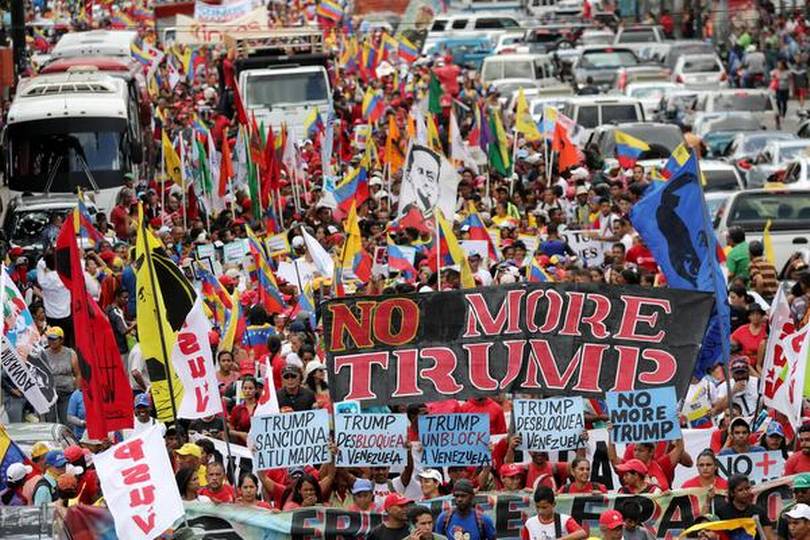By Susan Grey, Venezuela Solidarity Campaign & Vauxhall CLP Member
As Joe Biden takes over the US presidency there is much speculation over how much his Latin America policy will differ from that of Donald Trump. Whilst Trump’s sanctions on Venezuela have undoubtedly been harsher and more damaging than those that went before, it’s important to remember that they began with the Obama administration, with Biden as vice-president. On the positive side, Biden has acknowledged that the US has in the past been seen as a “bully, dictating policy to smaller countries”, and his advisors say he believes “the US should be operating in mutual respect and a sense of shared responsibility”.
However, it is noteworthy that he also intends to resume Obama’s “anti-corruption” drive, which provided cover – under the guise of false corruption allegations – for regime change efforts against left leaning countries in the region, such as Brazil. This and the early indications of his choices for foreign policy roles suggest there is limited reason for optimism.
Nevertheless, as Biden promises to “build back better” and repair the USA’s broken economy, he has a chance to be his own man and focus not only on solving problems at home, but also on genuine efforts to promote global peace and avoid unnecessary foreign interventions. This should include abandoning the sanctions on Venezuela that are illegal under international law and have served only to harm the people and hinder the prospects of political dialogue in the country.
The damage done by sanctions cannot be understated. Even the threat of sanctions can be enough to reduce confidence and disrupt business. This could be seen as early as 2015 when Obama issued an Executive Order designating Venezuela as “an unusual and extraordinary threat to US national security”. Within months foreign banks began questioning transactions involving Venezuela. Citibank refused to handle funds from Venezuela for the purchase of 300,000 insulin doses for diabetic patients. Commerzbank unilaterally closed the accounts of Venezuelan public institution and companies. Risk rating agencies assigned Venezuela the world’s highest financial risk, well above countries at war, despite it having fulfilled its external debt commitments.
Sanctions were initially focussed on specific Venezuelan officials, with US apologists claiming, in defiance of all the evidence, that they would only affect politicians and not the ordinary citizen. During the next few years sanctions ravaged the Venezuelan economy as multinational companies producing essential products pulled out of Venezuela causing shortages and widespread hardship.
Under Trump further executive orders explicitly prohibited financial transactions with Venezuela, giving legal status to the financial boycott. As subsequent executive orders increased the penalties for trading with Venezuela, more companies and even foreign governments buckled under pressure and joined the boycott.
For example, secondary sanctions forced Russian oil giant Rosnet to withdraw from business with Venezuela, payment of US$9 Million for dialysis supplies was blocked, disrupting treatment for 15,000 patients, the Brazilian government was unable to pay Venezuela for electricity supplied to Roraima state, and the Colombian government blocked shipment of 400,000 kilos of supplies for the Venezuelan food subsidy programme.
Foreign banks seized billions of Venezuelan funds, including 1.5 billion Euros by Novo Banco, 453 million Euros by Clearstream and £1.3 billion by the Bank of England.
The effects of sanctions have been devastating. The blockade has not only damaged the Venezuelan economy for over half a decade, it has obstructed the import of food and essential medical supplies, causing hardship to ordinary people, especially those on low incomes. Economists have calculated that in 2017-18 alone, sanctions caused up to 40,000 deaths.
Since then sanctions have been intensified yet again, with Trump resorting to extreme measures, including piracy, to obstruct legitimate trade between Venezuela and other countries. In 2020 the US intercepted Iranian ships destined for Venezuela and seized the cargoes of millions of barrels of gasoline which had already been paid for.
As the world grapples with the effects of the current pandemic, opposition to unilateral coercive sanctions has grown. The UN Secretary General António Guterres has called for the waiving of sanctions on Venezuela, saying “this is the time for solidarity not exclusion.” In a similar vein, the Pope has called for a reduction in “global sanctions that prevent the countries that suffer from them from providing adequate support to their citizens.”
As president, Biden has an opportunity now to show that he really can operate in mutual respect and a sense of shared responsibility. If mutual respect is to mean anything more than words, it must mean accepting Venezuelan President Maduro’s offer of peaceful dialogue and ending the crippling sanctions that have cost so many lives.
- Sign the petition against US sanctions on Venezuela at https://bit.ly/stopvenezuelasanctions

